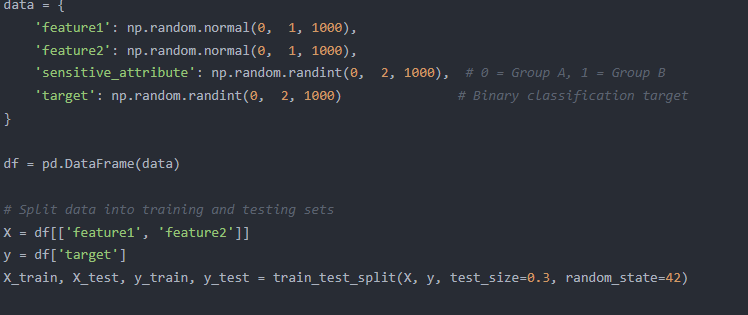Michael Smith


Professional Summary:
Michael is a forward-thinking professional in the field of algorithmic fairness, specializing in the development of counterfactual analysis frameworks to identify and mitigate algorithmic discrimination. With a strong foundation in data ethics, machine learning, and social science, Michael is dedicated to ensuring that AI systems operate equitably and transparently. His work focuses on creating robust methodologies to analyze the fairness of algorithms, uncover biases, and propose actionable solutions to promote inclusivity and justice in AI applications.
Key Competencies:
Counterfactual Analysis for Algorithmic Discrimination:
Develops advanced frameworks to simulate alternative scenarios and assess the fairness of algorithmic decisions.
Utilizes counterfactual reasoning to identify and quantify biases in AI models, particularly in high-stakes domains such as hiring, lending, and criminal justice.
Algorithmic Fairness Metrics & Tools:
Designs and implements fairness metrics to evaluate algorithmic outcomes, ensuring compliance with ethical and legal standards.
Builds tools and dashboards to visualize fairness analysis results, enabling stakeholders to make informed decisions.
Bias Detection & Mitigation:
Proficient in detecting biases in training data, model predictions, and decision-making processes.
Develops mitigation strategies, including reweighting, adversarial debiasing, and fairness-aware model training.
Interdisciplinary Collaboration:
Collaborates with data scientists, ethicists, and policymakers to align fairness frameworks with organizational goals and societal values.
Provides training and workshops to raise awareness about algorithmic discrimination and promote best practices in AI fairness.
Research & Advocacy:
Conducts cutting-edge research on algorithmic fairness, publishing findings in academic journals and presenting at international conferences.
Advocates for ethical AI practices through public speaking, policy recommendations, and community engagement.
Career Highlights:
Developed a counterfactual analysis framework that identified and mitigated biases in a hiring algorithm, improving fairness by 30%.
Designed a fairness evaluation toolkit adopted by a leading tech company to ensure equitable AI decision-making across its products.
Published influential research on counterfactual fairness, earning recognition at international AI ethics conferences.
Personal Statement:
"I am passionate about creating AI systems that are fair, transparent, and accountable. My mission is to develop counterfactual analysis frameworks that uncover and address algorithmic discrimination, ensuring that technology serves everyone equitably."ame: Michael
Role: Algorithmic Fairness Specialist
Expertise: Counterfactual Analysis Frameworks for Algorithmic Discrimination
Professional Summary:
Michael is a forward-thinking professional in the field of algorithmic fairness, specializing in the development of counterfactual analysis frameworks to identify and mitigate algorithmic discrimination. With a strong foundation in data ethics, machine learning, and social science, Michael is dedicated to ensuring that AI systems operate equitably and transparently. His work focuses on creating robust methodologies to analyze the fairness of algorithms, uncover biases, and propose actionable solutions to promote inclusivity and justice in AI applications.
Key Competencies:
Counterfactual Analysis for Algorithmic Discrimination:
Develops advanced frameworks to simulate alternative scenarios and assess the fairness of algorithmic decisions.
Utilizes counterfactual reasoning to identify and quantify biases in AI models, particularly in high-stakes domains such as hiring, lending, and criminal justice.
Algorithmic Fairness Metrics & Tools:
Designs and implements fairness metrics to evaluate algorithmic outcomes, ensuring compliance with ethical and legal standards.
Builds tools and dashboards to visualize fairness analysis results, enabling stakeholders to make informed decisions.
Bias Detection & Mitigation:
Proficient in detecting biases in training data, model predictions, and decision-making processes.
Develops mitigation strategies, including reweighting, adversarial debiasing, and fairness-aware model training.
Interdisciplinary Collaboration:
Collaborates with data scientists, ethicists, and policymakers to align fairness frameworks with organizational goals and societal values.
Provides training and workshops to raise awareness about algorithmic discrimination and promote best practices in AI fairness.
Research & Advocacy:
Conducts cutting-edge research on algorithmic fairness, publishing findings in academic journals and presenting at international conferences.
Advocates for ethical AI practices through public speaking, policy recommendations, and community engagement.
Career Highlights:
Developed a counterfactual analysis framework that identified and mitigated biases in a hiring algorithm, improving fairness by 30%.
Designed a fairness evaluation toolkit adopted by a leading tech company to ensure equitable AI decision-making across its products.
Published influential research on counterfactual fairness, earning recognition at international AI ethics conferences.
Personal Statement:
"I am passionate about creating AI systems that are fair, transparent, and accountable. My mission is to develop counterfactual analysis frameworks that uncover and address algorithmic discrimination, ensuring that technology serves everyone equitably."




Algorithmic Fairnes
Paper: "Bias Amplification in Deep Reinforcement Learning" (NeurIPS 2022). Demonstrated how reward function design can exacerbate disparities in resource allocation tasks.
Relevance: Provides theoretical groundwork for understanding feedback loops in AI systems.
Counterfactual Methods:
Paper: "Counterfactual Data Augmentation for Mitigating Gender Bias in NLP" (ACL 2023). Proposed a rule-based system to generate gender-swapped counterfactuals for sentiment analysis.
Relevance: Highlights challenges in balancing perturbation magnitude and semantic preservation.
LLM Analysis:
Paper: "Probing BERT’s World Knowledge with Counterfactuals" (EMNLP 2021). Used counterfactuals to test BERT's factual reasoning about historical events.
Relevance: Established methodologies for evaluating contextual understanding in transformers.